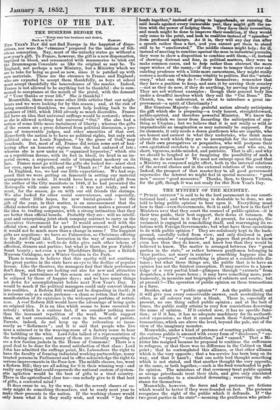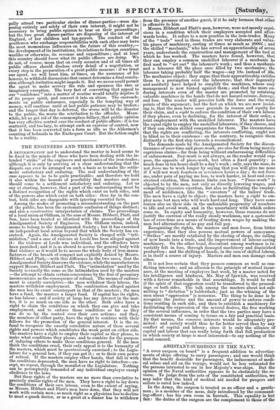111k, MYSTERY OF THE MINISTRY.
" Promo ornriorr " is said to be the lord paramount in our consti- tutional land ; and when anything is desirable to be done, we are told to bring public opinion to bear upon it. Everything must bow to that—even Governments. So it is said ; but how is the fact'? Ministers aver that they court the counsel of public opinion—it is their true guide, -their best support, their decus et tutamen. So they say, but what is it they do P At present, for example, Go- vernment is engaged in remodelling itself, and rearranging its re- lotions with Foreign Governments ; but what have those operafions to do with public opinion ? They are sedulously kept in the back- ground, carefully veiled from view, and only disclosed in part through oracular " explanations' in papers that profess to know even less than they do know, and know less than they would be believed to know. The matter is arranged between two " great parties in the state," or rather between gentlemen belonging to those parties, not many in number ; something happens also in "higher quarters," and something in places at a considerable dis- tance ; but what those things are, the public that is to have an opinion has not the faintest conception. It may survive to a know- ledge of a very partial kind—glimpses through " extracts " from despatches, a few years hence ; it may have something more, post- humously, in memoirs and biographies of cabinets and courts; but at present P—The operation of public opinion on these transactions is a farce.
Besides, -what is "public opinion"? Ask the public itself, and it will give you every conceiveable answer, each neutralizing the other, as all colours run into a blank. 'There is, especially at present, no one thing called public opinion ; and at the best of times, the public really attains to very few convictions deserving the name of opinion. If it existed now, it has no specific func- tion ; or if it has, it has no adequate machinery for its authenti- cated expression; so that it cannot reach these "distinguished" transactions, which are above the level, beyond the pale, out of the view of the imaginary monster. Meanwhile, under a kind of pretence of courting public opinion, the curious public is amused with every form of " disclosure," " ex- planation," " report," " contradiction " and " canard." That a Mi- nister htu: resigned because he pro ;led to continue the sufferance to refugees, or that there was no erence in the Cabinet on that point ; that he contemplated this alliance, or that other alliance which is the very opposite; that a tea-service has been long on its way, and that it hasn't; that one noble lord thought something which is not stated, and that another thought the very opposite, or the same, or both together,—such is the food vouchsafed to pub- lic opinion. The ministers of that ceremony treat public opinion as savage priesthoods treat their idols, and give only simulated meats in sacrifice to a simulated devouring; reserving the sub- stance for themselves.
Meanwhile, however, the faroe and the pretence are fictions which would be better if they were founded on fact. The pretence recognizes the right of the public which it defrauds. If " the two great parties in the state"—meaning the gentlemen who prinoi-; pally attend two particular circles of dinnerparties—were dis- posing entirely and solely of their own interest, it might not be necessary to bring public opinion to bear on their proceedings; but the two great dinner-parties are disposing of the interest of England, of her children and tax-payers. The conduct of the gentlemen who exchange responsibilities with each other may have the most momentous influences on the future of this country,— the development of its institutions, its relations to foreign countries, warlike or otherwise, its revenue and expenditure ; and at least this country should know what its public officers are doing. We do not, of course, mean that on every occasion and at all times all public officers should disclose every detail of a negotiation, or every step in the preparation of a great public measure : if we trust our agent, we will trust him, at times, on the assurance of his honour, to withhold discussions that cannot determine a final conclu- sion although irritation might impede it. But we never could permit the agent to make secrecy the rule and openness the rare or imaginary exception. The very fact of converting that appeal to our " confidence " into a matter of routine would totally deprive it of its proper spirit, and convert it into an abuse. The encroach- ments on public endurance, especially in the tempting way of money, will continue until at last pubis" patience may be broken; and the longer that day is deferred, the worse will be the disaster to the public, the worse the retribution to the offender. Mean- while, let us get rid of the commonplace fallacy, that public opinion has very effective control over the conduct of public affairs it is too scattered, and too lazy, to attempt such an exercise of control, now that it has been converted into a form as idle as the Aldermen's counting of hobnails in the Exchequer Court. But the fiction ought to be a reality.



































 Previous page
Previous page